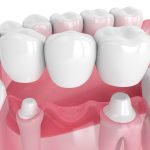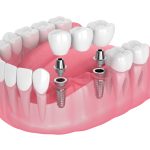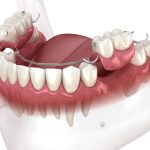Bridges Specialist
Complete Smile Restoration With Porcelain Dental Bridges
Missing teeth can negatively affect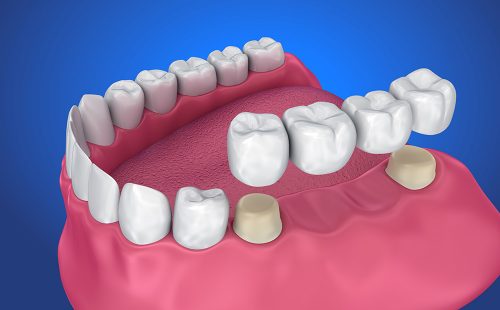 every aspect of your life, ranging from the way you chew and smile to even the shape of your face. If you need restoration of multiple teeth in a row, we provide high-quality porcelain dental bridges to restore your smile. At Dentistry of Highland Village, our Houston dentists provide a full range of cosmetic dental procedures and restorative dental services. Learn more by dialing (713) 360-7700.
every aspect of your life, ranging from the way you chew and smile to even the shape of your face. If you need restoration of multiple teeth in a row, we provide high-quality porcelain dental bridges to restore your smile. At Dentistry of Highland Village, our Houston dentists provide a full range of cosmetic dental procedures and restorative dental services. Learn more by dialing (713) 360-7700.
What Are Porcelain Dental Bridges?
Porcelain dental bridges are fixed appliances that have helped several patients replace missing teeth. They consist of prosthetic teeth (pontics) attached to a framework, anchored in place by dental crowns on adjacent natural teeth or dental implants. Using porcelain means they look and feel like natural teeth, providing a long-lasting solution for individuals with missing teeth.
Types of Porcelain Dental Bridges
Traditional Dental Bridges
Traditional dental bridges are the most common type of bridges and consist of one or more pontics (artificial teeth) held in place by dental crowns on adjacent natural teeth. The crowns are cemented onto the prepared teeth on either side of the gap.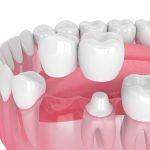
Cantilever Bridges
Cantilever bridges are similar to traditional bridges but are supported by dental crowns on only one side of the gap, rather than both sides. This type is ideal when there’s only one adjacent tooth available for support.
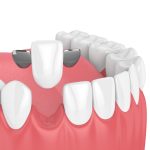
Maryland (Resin-Bonded) Bridges
Maryland bridges consist of a metal or porcelain framework with artificial teeth and wings on either side. The wings are bonded to the backside of adjacent teeth using a resin cement. This conservative option doesn’t require extensive tooth preparation.
Implant-Supported Bridges
Implant-supported bridges are secured in place by dental implants rather than dental crowns on natural teeth. Each implant is surgically placed in the jawbone, providing a stable foundation for the bridge. This type is often ideal when multiple adjacent teeth are missing.
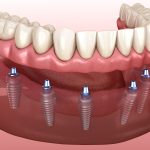
Hybrid (Implant-Supported Dentures)
Hybrid bridges combine dental implants with a fixed bridge, typically used to replace an entire arch of missing teeth. The bridge is anchored to the implants, providing a secure and stable solution for individuals with significant tooth loss.
Removable Bridges (Partial Dentures)
Removable bridges, also known as partial dentures, can replace one or more missing teeth. These bridges are not fixed in place and can be taken out for cleaning. They typically have metal or plastic clasps that attach to natural teeth for stability.
Benefits of Porcelain Dental Bridges
Porcelain dental bridges offer several benefits, making them a popular choice for replacing missing teeth. Here are some of the key advantages:
- Natural Appearance: Porcelain has a natural tooth-like appearance and can be color-matched to the surrounding teeth. This helps create a seamless and aesthetically pleasing smile.
- Durability: Porcelain is a strong and durable material, providing resilience to daily wear and tear. When properly cared for, porcelain dental bridges can last many years.

- Biocompatibility: Porcelain is biocompatible and well-tolerated by the body. It rarely causes allergic reactions or sensitivities, making it a safe choice for dental restorations.
- Comfortable Fit: Porcelain dental bridges are custom-made to fit the patient’s mouth precisely. This results in a comfortable fit that allows for natural speaking and eating without discomfort.
- Improved Chewing and Speech: Dental bridges restore the functionality of missing teeth, improving the ability to chew food properly and speak without impediments. This can positively impact a person’s overall quality of life.
- Prevention of Shifting Teeth: When a tooth is lost, neighboring teeth may start to shift into the gap, leading to misalignment. Dental bridges fill the empty space, preventing the surrounding teeth from moving and maintaining proper dental alignment.
The Porcelain Dental Bridge Process
Consultation
Before receiving your custom porcelain bridge, you’ll have an initial consultation with one of our Houston dentists. During the initial consultation, you and your dentist will discuss your dental needs and determine if a dental bridge is the appropriate solution for your case. Factors such as the number of missing teeth, the condition of adjacent teeth, and your oral health will be assessed.
Designing the Dental Bridge
If a traditional or cantilever bridge is recommended, the design phase involves creating a treatment plan based on impressions of your teeth. Your dentist will work with a dental laboratory to craft a custom bridge that matches the color, shape, and size of your natural teeth. For implant-supported or Hybridge bridges, a detailed imaging process may be involved to plan the precise placement of dental implants. The bridge design is then customized to attach securely to these implants.
Tooth Preparation
In the preparation phase, the adjacent teeth that will support the bridge are prepared by removing a small amount of enamel. This creates space for the dental crowns that will anchor the bridge. Impressions are taken for the dental laboratory to create the bridge.
For implant dental bridges, the dental implants are surgically placed in the jawbone. Healing time is allowed for the implants to integrate with the bone. Once integrated, abutments are attached to the implants, serving as the foundation for the bridge.
Bridge Placement
Once the permanent bridge is ready, it’s checked for fit and appearance. The dental crowns are then permanently cemented onto the prepared teeth, securing the bridge in place.
For implant-supported bridges, the customized bridge is attached to the abutments on the dental implants, providing a stable and long-lasting solution for missing teeth.
Post-Placement Adjustments
Your Houston dentist will make any necessary adjustments to ensure the bridge feels comfortable and functions properly. Proper oral hygiene practices and regular check-ups are emphasized to maintain the health of the bridge and surrounding teeth.
Porcelain Dental Bridge Aftercare
To ensure its longevity and maintain optimal oral health, it’s essential to follow proper aftercare practices. Here’s a guide to caring for your porcelain dental bridge:
- Oral Hygiene: Brush your teeth, including the bridge, at least twice a day using a soft-bristle toothbrush. Use fluoride toothpaste and pay attention to the gumline and areas around the bridge. Floss daily, preferably before bed.
- Regular Dental Check-ups: Schedule regular check-ups with your Houston dentist. Professional cleanings and examinations help detect any issues early and ensure the bridge remains in excellent condition.

- Avoid Certain Foods: Be cautious with hard, sticky, or overly chewy foods as they can damage the bridge or compromise the cement holding it in place. Consider cutting large or tough foods into smaller, more manageable pieces.
- Protect Against Teeth Grinding (Bruxism): If you grind your teeth at night, consider wearing a nightguard. Teeth grinding can exert excessive force on the bridge and may lead to damage over time.
- Limit Staining Substances: Porcelain is stain-resistant, but it’s advisable to limit the consumption of staining substances like coffee, tea, and red wine. If you consume such beverages, rinse your mouth with water afterward.
- Emergency Care: In case of accidents or emergencies, such as a broken bridge or severe pain, contact your Houston dentist immediately. Do not attempt to repair or adjust the bridge on your own.
- Address Discomfort or Irregularities: If you experience any discomfort, notice changes in the fit of the bridge, or if it feels loose, contact your dentist promptly. Adjustments may be necessary to maintain comfort and functionality.
- Quit Smoking: Smoking can contribute to staining and impact the longevity of dental restorations. If you smoke, consider quitting or reducing tobacco use for better oral health.
- Stay Hydrated: Drink plenty of water to maintain overall oral health. Water helps rinse away bacteria and food particles, reducing the risk of plaque buildup around the bridge.
- Follow Dentist Recommendations: Your Houston dentist may provide specific care instructions based on your oral health. Follow any recommendations for specialized cleaning tools or additional precautions.
Frequently Asked Questions
If you have one or more missing teeth and want a fixed, natural-looking solution, a porcelain dental bridge may be suitable. Schedule a consultation with your cosmetic dentist to assess your specific dental needs.
Porcelain dental bridges can be used to replace missing teeth anywhere in the mouth. Whether it’s a front tooth or a molar, a custom-designed porcelain bridge can restore both function and aesthetics.
The time frame varies, but typically involves an initial consultation, bridge design, tooth preparation, and bridge placement. The duration can range from a few weeks to a few months, depending on factors like bridge type and individual treatment needs.
Coverage varies among insurance plans. Some may cover a portion of the cost, while others may not. Your dental team can assist in verifying your insurance coverage and exploring financing options to make porcelain dental bridges more accessible.
Reclaim Your Smile With Porcelain Dental Bridges at Dentistry of Highland Village
Don’t let missing teeth affect your quality of life. Dial (713) 360-7700 to schedule a consultation with Dentistry of Highland Village. Our dedicated team is ready to discuss your dental needs, explore financing options, and help you achieve a confident and complete smile with porcelain dental bridges. Our team is here to help patients from Houston and surrounding areas such as Pasadena, Sugar Land, and Pearland, TX. Trust your Houston cosmetic dentists for affordable and effective restorative solutions!
MOST INSURANCES WELCOME AND MAXIMIZED!
NEW PATIENT SPECIALS & FINANCING OPTIONS AVAILABLE.
Contact us and schedule your visit today.
The Proof is in Our Patients




Specials & Offers
Ask About Our Specials
$159
Exam, x-rays, and regular cleaning
$59
Emergency exam and x-ray
| Monday | 7:00 AM – 5:00 PM |
| Tuesday | 7:00 AM – 5:00 PM |
| Wednesday | 7:00 AM – 5:00 PM |
| Thursday | 9:00 AM – 7:00 PM |
| Friday | 7:00 AM – 5:00 PM |
| Saturday | 7:00 AM – 3:00 PM |
| Sunday | Closed |

